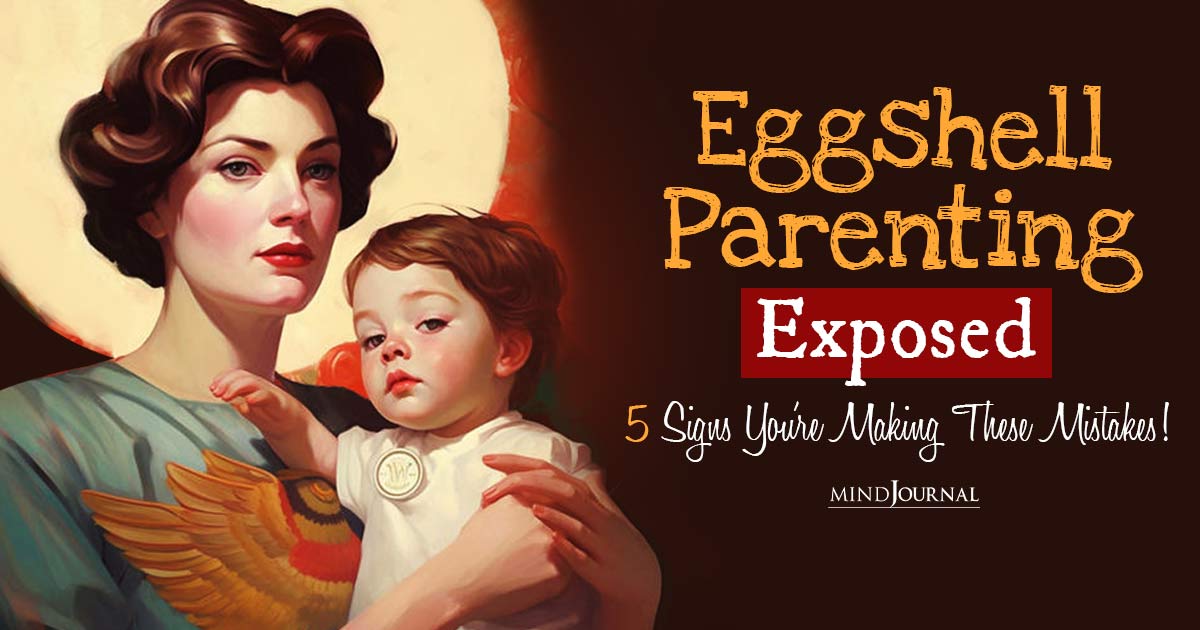Parenting is one of the most sincere tasks in every individual’s life that should be done with utmost care and coherence. However, the relationship between parents and their children is often tampered by the mental, and behavioral issues of the parents.
Thus, mood disorders and the violent nature of parents can affect the child’s life. Eggshell parenting is one such consequence. In this blog, we will guide you to understand eggshell parenting and show you the risky spots you should avoid.
What is Eggshell Parenting?

The literal meaning of eggshell parenting stated by Dr. Sage, a well-known psychologist, is making children walk on eggshells while they are with their parents. It symbolically suggests that the atmosphere is so threatening that children become scared to be with their parents. They always stay cautious regarding their doings.
Anna Hindell, a psychologist, explained that eggshell parenting occurs when children feel like they have to walk on eggshells around their parents because of their unstable moods, outbursts, and inconsistent behaviors.
Signs of Eggshell Parenting

Here are a few signs that can indicate your traits as an eggshell parent:
1. Extreme Mood Swings
Extreme mood swings are one of the most common signs of eggshell parenting. The unpredictability of parents’ moods makes children afraid of going near them. It may be related to the child’s action, or it may not. Thus, it seems that it is a way that parents use to release their personal frustration on their children.
2. Hyperactivity
Hyperreactivity, common in eggshell parenting, is an extreme response to trivial matters. This overreaction stems from a parent’s emotional imbalance regarding their parenting, and their children’s behavior. Thus, it results in an overly protective approach. Moreover, it can hinder a child’s urge to reach out to parents when they need it.
3. Bullying
As Dr. Sage says, eggshell parents can give “good love and bad love”. Good love is the affection that the children receive when they do something good and bad love means shaming, bullying, beating, or gaslighting, when they do something wrong. Verbally or physically abusing children is the most dangerous trait of eggshell parenting.
Read More: Know about 6 unique parenting practices
4. Unrealistic Expectations
Eggshell parenting is characterized by unrealistic expectations, which are unreasonably high standards for a child’s behavior or accomplishments. This comes out of parents when they become over-stressed with their child’s welfare. However, it blocks the child’s normal growth and puts unnecessary pressure on them which causes trouble in their personality growth.
5. Never Apologizing
Yes, parents sometimes need to apologize too. However, eggshell parents do not consider this as normal behavior and never apologize to their children even if they misbehave unnecessarily. It affects the child’s psyche and they grow up with the mindset that everything is their fault and they don’t deserve apologies.
Read More: 4 Types of Parenting Styles
Examples of Eggshell Parenting
To make the things more clear to you, here are a few examples of eggshell parenting:
Suppose a child has come home with a decent score and the parents have praised him or her initially. However, sometimes, say after having dinner or at the time of sleeping, the parents tell their child that it is not enough.
This kind of behavior gives the child a mixed signal which makes them confused and unhappy constantly. They feel that they are never enough to meet the expectations of their parents.
Refusing to let a child play outdoors due to fear of accidents, despite the neighborhood being safe, is also another example of eggshell parenting. It is like overly shielding them from normal experiences.
What are the lasting consequences of eggshell parenting?
The lasting eggshell parenting effects are as follows:
1. Anxiety
Anxiety is the most common consequence of eggshell parenting. As parents do not behave properly with their children the kids remain confused about their parents’ behavior. This in turn generates an anxious mindset among the children.
2. Over-Involvement with Parents
Eggshell parenting can lead to lasting over-involvement with parents. The constant shielding from minor challenges can take away independence, and increase reliance on parental guidance even in adulthood. This dependency may hinder personal growth.
3. Avoiding Relationships
When children face misbehaving from parents they tend to avoid relationships in the future because they grow a wrong mindset regarding relationships. They either become abusive or submissive or do not even try to get into any relationship because of embedded fear.
4. Hypervigilance
Eggshell parenting can make us super watchful. We’re always on edge, looking out for problems, even tiny ones. This constant worrying sticks with us, making it hard to relax and trust things will be okay without someone watching closely.
How to Avoid Doing Eggshell Parenting?
As soon as you identify your traits of eggshell parenting you should start working on improving your personality to rear your child properly. Here’s how to avoid this:
- Trust your child: Believe in their abilities to handle small problems and challenges.
- Encourage independence: Let them try things on their own, even if they might make mistakes.
- Set realistic expectations: Understand that they won’t always be perfect, and that’s okay.
- Communicate openly: Talk to your child about their feelings and concerns, and share yours too.
- Give them space: Allow them to have their own experiences and learn from them.
- Address your trauma: If you have traumatic experiences in the past, find the issues, and solve them. It will help you to be more compassionate to your child
- Give sincere praise: Acknowledge and value your child’s accomplishments and abilities. Don’t just concentrate on the negative.
- Seek help: If you find yourself in a tough spot then seek professional help like CBT, interpersonal therapy, etc.
By following these simple steps, you can avoid eggshell parenting and help your child grow into a confident and independent individual.
Read More: Learn scientific ways of good parenting
Takeaway
Eggshell parenting can happen without your understanding as it comes from your mental instability. Thus, addressing your mental health concerns is necessary to avoid this. Understand your traits, communicate with your child more, and let your child grow with the best mindset that they can positively influence society.
Frequently Asked Questions (FAQs) –
Who can become eggshell parents?
Generally, parents who are facing mental health issues are prone to become eggshell parents.
What are the risks of eggshell parenting?
Children may grow serious mood disorders including anxiety and depression for eggshell parenting.
Are eggshell parenting and C-PTSD related?
Facing eggshell parenting may or may not cause serious post-traumatic disorder. It depends on the intensity of the uncertain behavior of the parents.










Leave a Reply